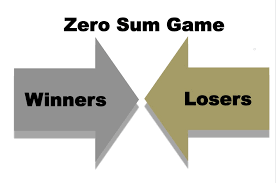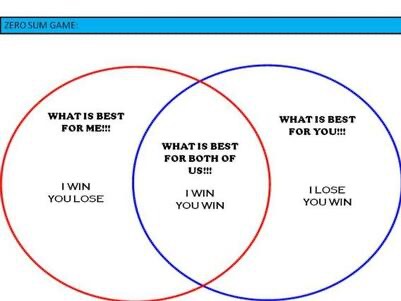 Zero-sum game is a phrase I see quite often and which I suspect is used but not understood. This is often seen in worthwhile statements such as "Happiness is not a zero sum game, and neither is life". By which what is meant that if it were a zero-sum game, you could have happiness (wealth, advantage of some description) only by someone else losing an equivalent amount. This is game theory, often explained in maths and economics courses. I shall explain, or attempt to.
Zero-sum game is a phrase I see quite often and which I suspect is used but not understood. This is often seen in worthwhile statements such as "Happiness is not a zero sum game, and neither is life". By which what is meant that if it were a zero-sum game, you could have happiness (wealth, advantage of some description) only by someone else losing an equivalent amount. This is game theory, often explained in maths and economics courses. I shall explain, or attempt to.
You have a 'game', which is a series of interactions (think turns in a board game) between participants. Generally it is assumed that all participants place the same value upon the commodities being traded. So movement of commodity is equated to movement of value and at all times the sum total of value remains the same. Thus gain by any participant must be matched by loss elsewhere. No-one is claiming that just because we have transactional situations which are zero-sum that ALL transactions are zero-sum. You have a surfeit of plums and I have a surfeit of apples and we could trade to mutual benefit —we're both better off. We could play Scrabble not so that one of us wins but so that the aggregate score is as good as we can make it. Link [35] to wikipedia on this. When I studied this at university, the idea was to assign probabilities to the possible actions and then to seek the decision route that would minimise loss – to minimise the maximum expected loss independent of the opponent's decisions. This fell within what I called at the time linear programming, specifically the study of the minimax method; I long ago gave away the textbooks, so I can't go browse to prompt memory.

This is a very attractive model. It offers routes to measurement and quantification and, implicitly to 'success'. Yet at the very same time that attraction drags us into competition and drags us into assuming that zero-sum is a necessary condition. The very same theory says that a non-zero-sum game for n players is equivalent to a zero-sum game with n+1 players. That last player represents the global profit or loss. We could interpret this as a corollary for there to be a global profit, some sort of global benefit, and then a general solution is to set as our objective that the optimal global profit is the desired result. Which requires each identifiable 'game' to be non-zero-sum – or to include the globe, in whatever sense that applies, as a player we wish to win.
Yet we persist in treating many of our daily interactions as if they are zero-sum in nature. This something we could easily change, if we could only agree that the result was desirable. In the same way that destruction is easier than construction, so I perceive that a zero-sum attitude, my gain for your loss, is easier. Perhaps in interpersonal interactions it is true that someone seeking gain at your expense will take it while your attitude remains that of the non-zero-sum player. Yet that one change, to see that, for example, happiness can be created—so the globe wins—can change your attitude to how you deal with people. It also means, I currently think, that those who visibly don't subscribe to such an idea are to be avoided. I have yet to discover how to intereact with such people to general advantage.